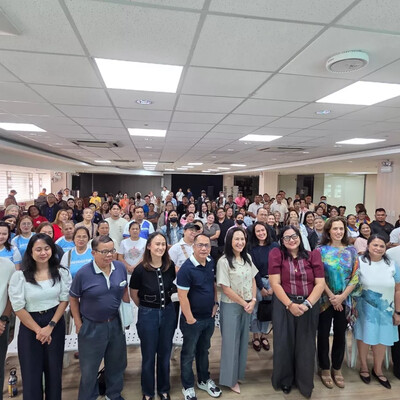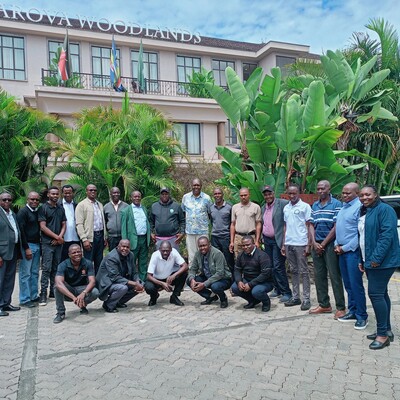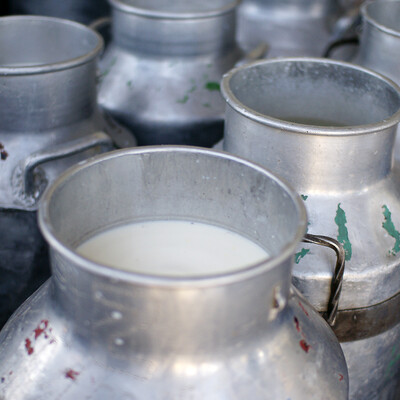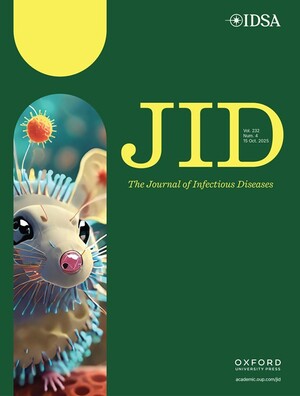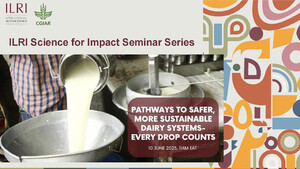
Kumaraguru Institutions and ILRI host forum on dairy landscape study of Tamil Nadu State, India
Dairy industry stakeholders met on 17 September 2023 to discuss on ‘Rapid study on the dairy landscape in Tamil Nadu’. It was jointly organized by Kumaraguru Institute of Agriculture and International Livestock Research Institute (ILRI), the meeting held at the Kumaraguru Institutions’ campus in Coimbatore, India, was attended by The Honourable Dairy Minister Mr Mano Thangaraj, Representatives of Tamil Nadu dairy cooperatives, the farming community, Research Institutions, and the private sector.
The rapid study collates the data and information from various methods, including desktop reviews, secondary data from government department and dairy industry, and primary data collection from farmers and other actors around the milk and feed value chain. This information will be used for developing a detailed roadmap for a pilot project to increase dairy productivity through feed improvement strategies. The overall aim of the study was to explore the dairy subsector landscape / systems in Tamil Nadu that will enable the Environmental Defense Fund to implement dairy productivity initiatives in the state. The study has been conducted in Coimbatore, Erode, Dindigul, Salem and Karur, where there is high potential for dairy productivity enhancement.

Habibar Rahman with Mano Thangaraj, minister for Dairy Development in the Government of Tamil Nadu, and other guests (photo credit: ILRI/South Asia).
Saravanan Chandrasekaran, General Manager, Kumaraguru Institutions, underscored the connection between education, research and innovation, and expressed the establishment’s commitment to supporting development in the dairy industry.
In the keynote speech, ILRI’s regional representative for South Asia, Habibar Rahman, spoke of ‘the importance of the dairy sector for livelihood and sustainability. He highlighted the importance of the dairy sector in India (India is ranked first in milk production globally and has 23% of global milk production), the challenges it faces (vicious circle of low productivity; Low investment, insurance and information access to the farmers; Underdeveloped market; improper fodder availability and quality; Unscientific management practices, etc.) and some strategies for sustainability including best feeding and breeding strategies for good production, balanced nutrition, better herd health management with digital technologies, etc. This study presents an opportunity to work with farmers across the state to increase the productivity of the animals through innovation in the dairy value chain,’ Rahman said.
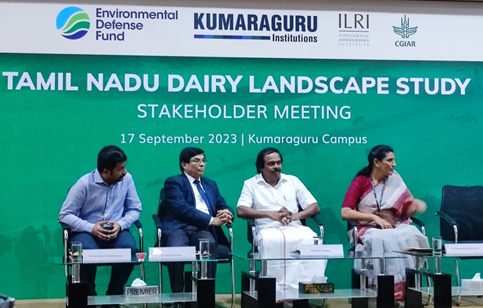
Guests at the dais during the meeting (photo credit: ILRI/South Asia).
Mano Thangaraj, minister for Dairy Development, Government of Tamil Nadu, appreciated the work undertaken by ILRI South Asia and requested the institute to develop some programs for livestock development in Tamil Nadu and plan for a bigger meeting in Chennai, the state capital. While highlighting the dairy sector development activities in Tamil Nadu, he invited ILRI to develop a livestock masterplan to support these activities.
‘The livestock sector only contributes 13% to the agriculture GDP in Tamil Nadu, which is low compared to the national average of about 30%. We will arrange a meeting in Chennai with ILRI and other stakeholders to discuss this and other concerns regarding the development of the livestock sector in the state,’ Thangaraj said about the need for milk is increasing. The Government will help in bringing in new schemes and make it easily accessible for everyone. He talked about subsidiary loans for livestock from government can be made more accessible with less interest percentage. Through his efforts the Interest rate has reduced from 15% to 9% for livestock loans. And also Help in livestock production throughout TN through AAVIN. Correct method of food intake Can give a best production of livestock growth. Asia has the least milk production compared to its population and Consumption with EU countries. Even with leading world population, being 2nd in place with 26% of world population we have to increase our livestock production for increasing need. The primary objectives were to discuss the project's inception, its findings, and its future plans. The project, focused on the Tamil Nadu Dairy Study across six districts encompassing 30 villages, had representation from Dharapuram, Karur, Dindigul, Pollachi, Erode and Salem.
Thanammal Ravichandran, program manager (Research), Kumaraguru Institutions, emphasizes the crucial role of livestock in village life, particularly in India, where milk production from animals amounts to an impressive 220 tonnes. However, she expresses concern that India's status as the global leader in milk production is not a point of pride due to the looming threat of global warming.
She mentioned policy implications on the reduction of buffalo population, citing their historical significance and potential benefits for farmers. She praises successful cooperative models in states like Gujarat, Karnataka, and Tamil Nadu, emphasizing the challenges faced by non-cooperative farmers. She underscores the importance of suitable feed for crossbred dairy animals and references her use of the ILRI feed assessment tool. She reiterates the significance of land, labor, credit, water, and knowledge in agriculture, particularly in regions with low rainfall. Livestock, especially buffaloes, is highlighted as a reliable income source in water-scarce areas. Dr. Thannammal stresses the importance of green fodder for reducing the cost of milk production. She calls for digital innovations for evidence-based extension services, and knowledge dissemination to improve key issues and enhance milk productivity.
The farmers and representatives of the various fields were segregated into different groups for group discussion. Participants discussed challenges in dairy farming, they opined that the focus should shift to high-quality breed cows through proper calf rearing, combating low milk production. Labor shortages impacting production could find relief through automation/ collective machinery usage. Efficient use of green fodder, decentralized farming, and technology-based training can enhance productivity. Awareness gaps among farmers can be bridged through digital apps providing feed charts. Tackling frequent cow illnesses requires preventive measures and traditional remedies.

Photo taken during the Focus Group Discussion with farmers (photo credit: ILRI/South Asia).
This study was funded by EDF (Environmental Defense Fund), a USA based not for-profit organization that works on Environment conservation initiatives across the world
(The post was edited by Terry Mwenda, communications officer, publishing and editing, ILRI, and Paul Karaimu, communications officer, ILRI)






